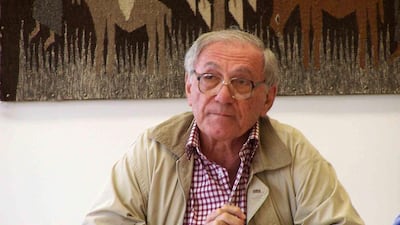Political prophets are rarely recognised in their time. It was the tragedy of the Syrian intellectual Sadiq Al Azm that he went unrecognised twice, decades apart.
Al Azm was one of the Middle East’s foremost intellectuals, celebrated in the Arab world and in the West – he read for his doctorate at Yale, was quoted in Arab academic circles, was awarded the Goethe Medal and was jailed for his writing. In the middle of December, at the age of 82, he died in Berlin, where he was living in exile.
Those who swim against intellectual currents are always likely to be washed away by the tides of politics. That happened to Sadiq Al Azm more than once.
He wrote and spoke extensively at two pivotal moments in the modern Middle East – the tumultuous 1960s and 1970s of Arab nationalism, and the Arab Spring of the early 21st century. At both times, he spoke clearly, but was listened to too late.
Al Azm’s early period was marked by two important books: Self-Criticism After the Defeat in 1968, about the effect on Arab societies of the 1967 war with Israel, and The Critique of Religious Thought, published a year later, in which he urged reforms to Islamic thought.
Both, in their own way, were deeply controversial. Indeed, Critique set off across the Levant as vehement a debate as the publication of The Satanic Verses was to do decades later in the West.
But it was Self-Criticism that was rediscovered decades later, when Al Azm’s arguments that Arab governments needed to reform and put development at the heart of their politics was suddenly seen as presaging the Arab uprisings. Al Azm, who was debated but ignored in the 1970s, found himself hailed as a seer, but without political influence.
Al Azm was one of those figures who doesn’t appear much in day-to-day news, but who affects the intellectual currents below the surface. He became better known in the West during his long-running dispute with Edward Said over Said’s ground-breaking book Orientalism.
As always with the contentious area of Middle East studies, and its close effect on the policies of powerful western countries, these intellectual disagreements became weaponised for political purposes. Al Azm found himself pigeonholed as the man who was speaking truth to the Arabs, warning them against blaming the West for all the ills of the region. In that, he was contrasted with Said, whose Orientalism was parodied as a book exempting the Middle East from blame. Anyone who has read both books will readily note the nuance of their positions, but, again, the tide of politics was too strong.
Al Azm always maintained a measure of repute within Arab and western intellectual circles. But like many professors, he found his reputation in the wider public mind waxed and waned depending on political developments. The Syrian crisis brought him back to the public imagination, not least because, speaking in both Arabic and English, he was an implacable critic of the Syrian regime.
Until the end, Al Azm remained an optimist on the Arab uprisings, seeing in them a great declaration of the power of civil society – even in the face of opposition from regimes such as Syria’s, or organised Islamist parties such as Egypt’s Muslim Brotherhood.
Al Azm never accepted the now commonly-held view of the conflict as a civil war. Instead, drawing a contrast with Lebanon, he noted that there the civil war meant that every sectarian group – Christians, Sunni and Shia Muslims, Druze etc – all armed themselves to attack each other. In Syria, however, the focus of the fighting was still the regime – and the regime, above all, was the cause of the greatest casualties and most brutal attacks.
But as the conflict intensified, Al Azm, like many who wrote about Syria, found himself having to expend considerable energy and ink defending the original protesters and their ideals. As the regime systematically pulverised all opposition but the most extreme, a false dichotomy was presented: Assad or ISIL. It is to the shame of many writers, in the Middle East and in the West, that they have accepted this dichotomy, leaving almost no room to discuss what Syria could look like had a genuine revolution succeeded.
That is a shame, because Al Azm was one of the few intellectuals who remembered the long decades of political arguments before the Arab uprisings, and was therefore able to set the uprising in the correct context.
He viewed the uprising as a continuation of the Damascus Spring of the early 2000s, but he also located the animating forces of the uprising further back, in the decades of repression before 2011. As a Marxist, he was sensitive to the role of social class in Syria’s prior struggles and in this one, noting the divides within the society ran deep, and ran back decades.
By then, of course, it was too late. Politics had again overtaken Al Azm. Having been rediscovered, he was once again marginalised, as he had been decades before.
Asked in 2013 if he thought he would ever return to Damascus, Al Azm said he wouldn’t go back until the regime had fallen. A tragedy for him and for the country is that the Syrian regime outlived one of Syria’s greatest sons and thinkers.
falyafai@thenational.ae
On Twitter: @FaisalAlYafai


